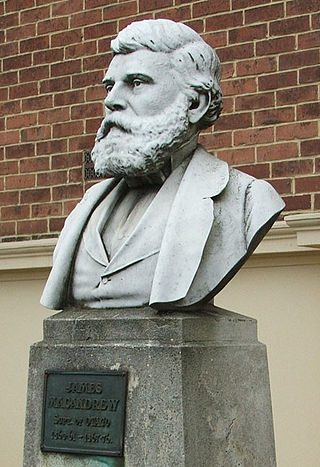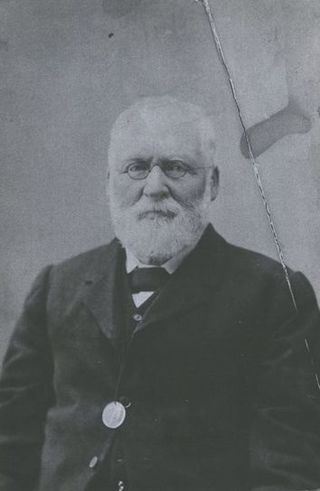Related Research Articles

James Macandrew was a New Zealand ship-owner and politician. He served as a Member of Parliament from 1853 to 1887 and as the last Superintendent of Otago Province.

William Hutchison was a New Zealand politician and journalist. Hutchison and his son George were both Members of Parliament.

Thomas Bannatyne Gillies was a 19th-century New Zealand lawyer, judge and politician.

Thomas Dick was a 19th-century New Zealand politician. Originally a merchant, he worked in London and then represented his firm on Saint Helena for seven years. From there, he was sent to Dunedin as the company's representative; he emigrated with an extended family. He soon became involved in politics and was Superintendent of Otago Province from 1865 until 1867. Over a period of 24 years, he represented various Dunedin electorates in Parliament and was Colonial Secretary (1880–1884), Minister of Justice from 1881 to 1882, and Minister of Education from 1881 to 1884. A deeply religious man, he was involved in many church affairs. He was one of the founders of Hanover Street Baptist Church; the building is now classified as Category I by Heritage New Zealand.
Bruce was a rural parliamentary electorate in the Otago region of New Zealand, from 1861 to 1922. For part of the 1860s with the influx to Otago of gold-miners it was a multi-member constituency with two members.

Edward Bowes Cargill was a 19th-century businessman and Member of Parliament in Dunedin, Otago, New Zealand. He was the Mayor of Dunedin from 1897 to 1898.
City of Dunedin, during the first two parliaments called Town of Dunedin, was a parliamentary electorate in Dunedin in Otago, New Zealand. It was one of the original electorates created in 1853 and existed, with two breaks, until 1905. The first break, from 1862 to 1866, was caused by an influx of people through the Otago Gold Rush, when many new electorates were formed in Otago. The second break occurred from 1881 to 1890. It was the only New Zealand electorate that was created as a single-member, two-member and three member electorate.
Dunedin and Suburbs South was a parliamentary electorate in the city of Dunedin in Otago, New Zealand from 1862 to 1866. From 1863 it was a multi-member electorate.
James Paterson was a 19th-century Member of Parliament in Otago, New Zealand. He was a cabinet minister, and on the Legislative Council.
The 3rd New Zealand Parliament was a term of the Parliament of New Zealand. Elections for this term were held between 12 December 1860 and 28 March 1861 in 43 electorates to elect 53 MPs. Two electorates were added to this during this term, Gold Fields District and a new Dunedin electorate created by splitting the existing City of Dunedin into Dunedin and Suburbs North and Dunedin and Suburbs South, increasing the number of MPs to 57. During the term of this Parliament, six Ministries were in power.
Edward McGlashan was a 19th-century Member of Parliament in Dunedin, Otago, New Zealand.
William Baldwin, born John Baldwin was a 19th-century Member of Parliament in the Otago region of New Zealand.

Samuel Edward Shrimski was a 19th-century Member of Parliament and then a Member of the Legislative Council from Otago, New Zealand.

John Hyde Harris was a 19th-century New Zealand politician. Born in England, he came to Dunedin as a young man and practised as a lawyer, and was then a judge. He entered provincial politics and was elected as the fourth Superintendent of the Otago Province. He then became Mayor of Dunedin and was called to the Legislative Council. He played one first-class cricket match during the 1865–66 season.
The Dunedin Country by-election 1860 was a by-election held in the multi-member Dunedin Country electorate during the 2nd New Zealand Parliament. The by-election was caused by the resignation of incumbent MP William Cargill. The nomination meeting was held on 28 March and as Thomas Gillies was the only person proposed, he was declared elected unopposed.
The Bruce by-election 1862 was a by-election held in the multi-member Bruce electorate during the 3rd New Zealand Parliament, on 31 July 1862. The by-election was caused by the death of incumbent MP Charles Kettle on 5 June, and was won by Edward Cargill.
Joseph Barnes Borton was a New Zealand goldfields warden and cricketer. Along with William Gilbert Rees, Gibson Turton, James Fulton, and John Kissling, he is credited with reviving interest in cricket in Otago in the 1860s.
William John Dyer was a New Zealand businessman and politician. Born in London, his family moved to Sydney when he was a child. He ran a trading business between Sydney, New Zealand and the Pacific Islands, and moved to New Zealand in 1857. He lived at different times in Dunedin and Milton and entered politics, contesting a number of elections and representing the Tokomairaro electorate in the provincial council.
The April 1865 Bruce by-election was a New Zealand by-election held in the multi-member electorate of Bruce during the 3rd New Zealand Parliament on 8 April 1865. It was triggered on 9 January that year by the resignation of separationist Thomas Gillies and won by prominent settler Arthur John Burns. The more liberal businessman William John Dyer was the sole other contester of the by-election, finishing with 43.33% of the vote.

John Bradley Shacklock was a New Zealand iron founder and politician. He served as mayor of Dunedin from 1914 to 1915.
References
- Scholefield, Guy (1950) [First published in 1913]. New Zealand Parliamentary Record, 1840–1949 (3rd ed.). Wellington: Govt. Printer.